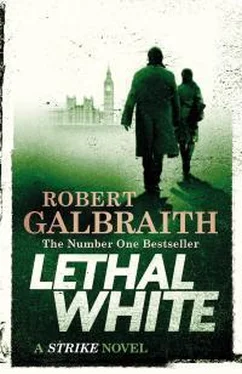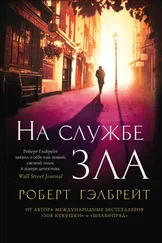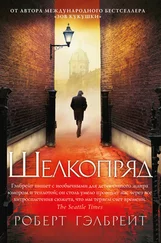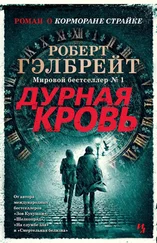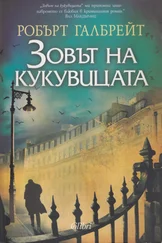‘My sister sold her a horse.’
During the sixteen years of Strike’s on-off relationship with Charlotte, he had been privy to countless conversations like this. People of Charlotte’s class all seemed to know each other. Even if they had never met, they knew siblings or cousins or friends or classmates, or else their parents knew somebody else’s parents: all were connected, forming a kind of web that constituted a hostile habitat for outsiders. Rarely did these web-dwellers leave to seek companionship or love among the rest of society. Charlotte had been unique in her circle in choosing somebody as unclassifiable as Strike, whose invisible appeal and low status had, he knew, been subjects of perennial, horrified debate among most of her friends and family.
‘Well, I hope it wasn’t a horse Amelia liked,’ Izzy said, ‘because Kinvara will ruin it. Awful hands and a horrible seat, but she thinks she’s Charlotte Dujardin. D’you ride, Cormoran?’ Izzy asked.
‘No,’ said Strike.
‘He doesn’t trust horses,’ said Charlotte, smiling at him.
But he did not respond. He had no desire to touch upon old jokes or shared memories.
‘Kinvara’s livid, look at her,’ said Izzy, with some satisfaction. ‘Papa’s just dropped a heavy hint he’s going to try and talk my brother Raff into taking over from me, which is fabulous , and what I hoped would happen. Papa used to let Kinvara boss him around about Raff, but he’s putting his foot down these days.’
‘I think I’ve met Raphael,’ said Charlotte. ‘Wasn’t he working at Henry Drummond’s art gallery a couple of months ago?’
Strike checked at his watch and then back around the room. The prince was moving away from their part of the room and Robin was nowhere to be seen. With any luck, she had followed the trustee who had dirt on Winn into the bathroom and was eliciting confidences over the sink.
‘Oh Lord,’ said Izzy. ‘Look out. Geraint Bloody – hello, Geraint!’
Geraint’s object, it soon became clear, was Charlotte.
‘Hello, hello,’ he said, peering at her through heavily smudged glasses, his lipless smile a leer. ‘You’ve just been pointed out to me by your niece. What an extraordinary young woman she is, quite extraordinary. Our charity’s involved in supporting the equestrian team. Geraint Winn,’ he said, holding out a hand, ‘The Level Playing Field.’
‘Oh,’ said Charlotte. ‘Hello.’
Strike had watched her repel lecherous men for years. Having acknowledged his presence, she stared coldly at Geraint, as though quite puzzled to know why he was still in her vicinity.
Strike’s mobile vibrated in his pocket. Reaching for it, he saw an unknown number. This was his excuse to leave.
‘Need to get going, sorry. ’Scuse me, Izzy.’
‘Oh, that’s a shame,’ Izzy said, pouting. ‘I wanted to ask you all about the Shacklewell Ripper!’
Strike saw Geraint’s eyes widen. Inwardly cursing her, he said, ‘Night. Bye,’ he added to Charlotte.
Limping away as fast as he could manage, he accepted the call, but by the time he had raised it to his ear, the caller had gone.
‘Corm.’
Somebody lightly touched his arm. He turned. Charlotte had followed him.
‘I’m leaving, too.’
‘What about your niece?’
‘She’s met Harry, she’ll be thrilled. She doesn’t actually like me that much. None of them do. What happened to your mobile?’
‘I fell on it.’
He walked on, but, long-legged as she was, she caught up with him.
‘I don’t think I’m going your way, Charlotte.’
‘Well, unless you’re tunnelling out, we have to walk two hundred yards together.’
He limped on without answering. To his left, he caught another flash of green. As they reached the grand staircase in the hall, Charlotte reached out and lightly grasped his arm, wobbly in the heels that were so unsuitable for a pregnant woman. He resisted the urge to shake her loose.
His mobile rang again. The same unknown number had appeared on the screen. Charlotte drew up beside him, watching his face as he answered it.
The moment the mobile touched his ear he heard a desperate, haunting scream.
‘ They’re going to kill me, Mr Strike, help me, help me, please help me . . . ’
34
But who could really foresee what was coming? I am sure I could not.
Henrik Ibsen, Rosmersholm
The hazy, clear-skied promise of another summer’s day hadn’t yet translated itself into actual warmth when Robin arrived next morning at the café closest to Chiswell’s house. She could have chosen one of the circular tables outside on the pavement, but instead she huddled down in a corner of the café where she was to meet Strike, hands clasped around her latte for comfort, her reflection in the espresso machine pale and heavy-eyed.
Somehow, she had known that Strike would not be here when she arrived. Her mood was simultaneously depressed and nervy. She would rather not have been alone with her thoughts, but here she was, with only the hiss of the coffeemaker for company, chilly in spite of the jacket she had grabbed on the way out of the house and full of anxiety about the imminent confrontation with Chiswell, who might quibble his bill, after the catastrophe of Strike’s fight with Jimmy Knight.
But that wasn’t all that was worrying Robin. She had woken that morning from a confused dream in which the dark, spike-booted figure of Charlotte Ross figured. Robin had recognised Charlotte immediately when she spotted her at the reception. She had tried not to watch the once-engaged couple as they’d talked, angry with herself for being so sharply interested in what was passing between them, yet, even as she had moved from group to group, shamelessly insinuating herself into conversations in the hope of finding the elusive Elspeth Curtis-Lacey, her eyes had sought out Strike and Charlotte, and when they left the reception together she had experienced a nasty sensation in her stomach, akin to the drop of an elevator.
She had arrived home unable to think of anything else, which had made her feel guilty when Matthew emerged from the kitchen, eating a sandwich. She had the impression that he had not been home long. He subjected the green dress to an up-and-down look very like the one Kinvara had given her. She made to walk past him upstairs, but he had moved to block her.
‘Robin, come on. Please. Let’s talk.’
So they had gone into the sitting room and talked. Tired of conflict, she had apologised for hurting Matthew’s feelings by missing the cricket match, and for forgetting her wedding ring on their anniversary weekend. Matthew in turn had expressed regret for the things he had said during Sunday’s row, and especially for the remark about her lack of achievements.
Robin felt as though they were moving chess pieces on a board that was vibrating in the preliminary tremors of an earthquake. It’s too late. You know, surely, that none of this matters any more?
But when the talk was finished, Matthew said, ‘So we’re OK?’
‘Yes,’ she replied. ‘We’re fine.’
He had stood up, held out a hand and helped her up from her chair. She had forced a smile and then he had kissed her, hard, on the mouth, and begun to tug at the green dress. She heard the fabric around the zip tear and when she began to protest, he clamped his mouth on hers again.
She knew that she could stop him, she knew that he was waiting for her to stop him, that she was being tested in an ugly, underhand way, that he would deny what he was really doing, that he would claim to be the victim. She hated him for doing it this way, and part of her wanted to be the kind of woman who could have disengaged from her own revulsion and from her own reluctant flesh, but she had fought too long and too hard to regain possession of her own body to barter it in this way.
Читать дальше
